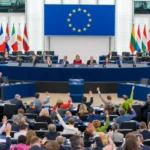The conservatives of the EPP, the socialists of the S&D and the liberals of Renew mainly support a compromise reached in the Economic Affairs Committee (ECON) at the end of December to negotiate with the Council. A vote to this effect was won on Wednesday noon by 431 votes to 172 and 4 abstentions.
On the Belgian side, the left-wing elected officials all voted against: the S&D Marie Arena (PS) and Kathleen Van Brempt (Vooruit), the Ecolo and Groen Philippe Lamberts, Saskia Bricmont and Sara Matthieu, the PTB Marc Botenga and the non-registered Marc Tarabella.
In mid-December, several thousand people marched in the streets of Brussels, at the call of European unions, to denounce the return of budgetary rules. These have been suspended over the last three years to allow States to invest massively in the face of the covid-19 crises and then the Russian invasion of Ukraine.
For the co-president of the Greens/ALE Philippe Lamberts, the new rules mean the return of budgetary austerity. However, “the climate emergency, carbon neutrality, the green industrial revolution, the war in Ukraine: all of this requires public authorities to invest a minimum of 2% of GDP each year for the next 25 years. »
“It is inevitable that part of these investments will be financed by public borrowing. These rules will clip our wings, at a time when we must face challenges,” added the Belgian elected official, deeming this attitude “suicidal”. The day before, he had wished the Belgian presidency of the Council of the EU “failure” on the reform of budgetary rules.
Marc Botenga, for his part, points out the left-wing parties which oppose these rules at the European level while they would tolerate them within Vivaldi. “Between 4.5 and 7.5 billion austerity budget cuts for Belgium. This is what the Belgian presidency of the European Union will be for if we let Vivaldi do its thing. How can the PS and Ecolo ministers support this? “, he asked, demanding that the Belgian presidency “sabotage” this negotiation.
In the project submitted to the vote, countries which, like Belgium, have a debt greater than 90% of GDP should reduce this ratio by 1% per year on average over the period of budgetary adjustment (4 to 7 years). The ECON committee report proposes an additional period of 10 years to complete the reduction of excessive debt.
For the group of socialists and social democrats (S&D), everything represents a “balanced package, which reinforces the democratic and social dimension of the new rules, as well as investment”, according to the Portuguese Margarida Marques, co-rapporteur. She defends a proposal which, according to her, includes: a strong social dimension, greater flexibility in debt management and incentives to invest in key EU priorities such as climate, digital, defense and social sectors.
For her co-rapporteur colleague Esther De Lange (PPE), “we cannot escape our responsibility for tomorrow by escaping it today. The text introduces a certain margin of maneuver, in particular to allow the necessary climate investments, but it is also based on viable finances in order to prevent future generations from being subjected to excessive debt. »
This article is originally published on sudinfo.be






